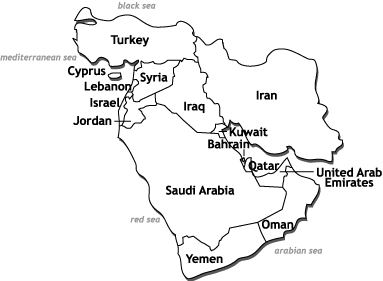Israel brought its offensive in Lebanon to south Beirut Friday, with warplanes blasting residential neighborhoods, destroying Hezbollah's headquarters and targeting road links. Airstrikes cut the main highway to Syria and exploded fuel tanks. Warships blockaded Lebanon's ports for a second day.A look at the map of the Middle East shows not only how wide spread an Israeli war against Syria and Iran would be, but also that we'd be right in the middle of it, since the only way to Iran is through Iraq.
Hezbollah said the residence and office of its leader, Sheik Hassan Nasrallah, had been destroyed, but that he and his family were safe. Palls of smoke rose from the Haret Hreik neighborhood in the late afternoon, after four huge explosions shook the capital. They were followed minutes later by a fifth blast.
Lebanese guerrillas retaliated for the airstrikes with a barrage of Katyusha rockets throughout the day, hitting more than a dozen communities across northern Israel....
Israel's escalating incursion into Lebanon could turn its border fight with militant Islamists into a regional war that Israel is openly warning might lead to Syria, and beyond that to Iran.
Already the violence has engaged the Israeli military on two fronts, against Hezbollah militias in Lebanon to the north and Hamas forces that control the Palestinian government in the Gaza Strip to the west. Israel now is fighting not with Palestinians or Arab nations, as in the past, but with the forces of radical Islam.
And the Israelis are bluntly saying that the blame for the violence by those forces lies in large measure with the governments of Syria and Iran for giving them support and encouragement -- an assertion that could put the U.S. and Israel on diverging paths in the crisis. "The real masterminds [behind these acts] are in Tehran and Damascus," Daniel Ayalon, Israel's ambassador to Washington, said Thursday. The international community "needs to call Iran to task," he said.

Israel, however, is in a terribly difficult position, in that it is under constant low-level attack by organized militant groups which Syria and Iran tollerate and fund, but are not considered formally 'responsible' for. And looming over is all is the knowledge that if there is going to be a wider Middle East war, it would be far better to have it before Iran has nukes than afterwards.






1 comment:
Israel has nukes, and I believe they are not afraid to use them (proportional retaliation, of course).
Post a Comment